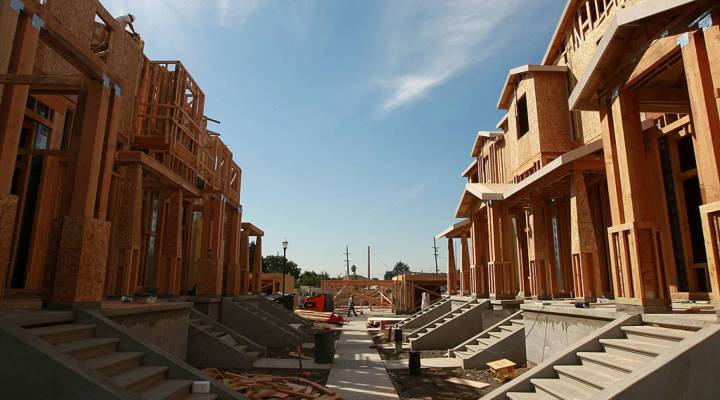
Millennials are helping to strengthen the home market

The housing market continues to strengthen. Home prices nationwide were up 5.9 percent year-over-year in January, reaching a 31-month high.
Home sales also jumped to 5.5 percent in February — the strongest reading since April 2010, according to a new report from the National Association of Realtors (NAR).
So what’s behind the changes happening in the market?
Millennials are growing up
As millenials get older, they’re becoming more established in their careers and starting to settle down, said Marketplace contributor Chris Farrell. So we’re seeing a rise in first-time, millennial homebuyers.
Millennials are the largest demographic group, but haven’t been participating in the housing market, according to Reuters.
- RELATED: Millennials like city homes, but not the high prices
- Will tax reform upend market for low-income housing?
- Housing had been held back by too few new homes
Housing had been sluggish a few years ago, with some placing the “blame” on young people who interrupted a real estate chain reaction: They buy starter homes from middle-aged people who in turn upgrade to bigger homes. Anxiety over student loan debt, low-paying freelance jobs and unemployment rates had put off some millennials from even considering real estate a few years ago.
But some real estate sites predict there’ll be a turnaround this year. Rental affordability will improve as incomes rise and rent growth slows down, according to predictions from Zillow. And Realtor.com estimates that millennials will soon make up 33 percent of the market, with boomers making up 30 percent.
The forecast for interest rates
The Federal Reserve decided to raise interest rates a quarter of a percentage point this month, signaling that it would boost rates two more times this year. Those expectations may be prompting consumers to act fast.
Recent data show that the average 30-year fixed mortgage rate sits at 4.16 percent. When that mortgage number tops 4 percent, it can cause some worry.
“We continue to see mortgage rates creeping up, so there is concern about how that’s going to impact affordability,” Selma Hepp, chief economist at real estate firm Pacific Union, told us last year.
Delaying the home search may mean paying higher interest rates later in the year, said Lawrence Yun, the National Association of Realtors’ chief economist, in the recent NAR report.
A limited housing supply
In December, the housing inventory was at its lowest level since 1999, which is when the NAR started collecting that data. Zillow also said that there are 3 percent fewer homes to choose from than the previous year.
Why is inventory lower?
This is, to a large extent, a consequence of the housing market crash, Farrell said.
About 1.4 million home-building jobs were lost through the Great Recession and housing bust, according to Robert Denk, senior economist at the National Association of Home Builders. Many skilled construction workers retired or decided to find work elsewhere.
“Our builder-members are telling us that they’re having a lot of trouble meeting the existing, and increasing, demand,” Denk told us, “because they’re having trouble with the supply of developed lots and skilled labor.”
There’s a lot happening in the world. Through it all, Marketplace is here for you.
You rely on Marketplace to break down the world’s events and tell you how it affects you in a fact-based, approachable way. We rely on your financial support to keep making that possible.
Your donation today powers the independent journalism that you rely on. For just $5/month, you can help sustain Marketplace so we can keep reporting on the things that matter to you.


















